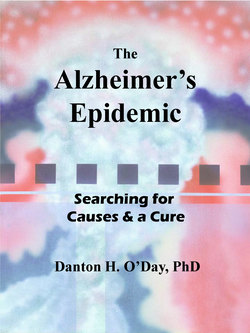Читать книгу The Alzheimer's Epidemic - Danton O'Day - Страница 28
На сайте Литреса книга снята с продажи.
MCI: Mild Cognitive Impairment
ОглавлениеOften the initial discovery of Alzheimer’s disease in an individual begins with that person’s concern about their perceived loss of memory. As we age, we all get concerned about the fact we can’t immediately recall details. We forget where we left our car keys or glasses. We can’t remember the name of a TV show. Our memory fails us in the middle of a story when a specific fact can’t be immediately recalled. All of this can make us think that we are losing our mind. When this concern becomes great enough, some of us (sadly not everyone) will go to a doctor, hoping for reassurance. In most cases, that reassurance is forthcoming. At other times it is not. This change in memory sometimes is an initial indicator that all is not well with, as Hercule Poirot put, “the little gray cells”.
As mentioned in Chapter 1 and above and summarized in Figure 3.5, aging can lead to forgetfulness that doesn’t progress or have anything to do with Alzheimer’s disease. On the other hand, some individuals will suffer from the disease at a young age, often well below age 65. Early-onset Alzheimer’s disease is discussed in various places in this book but detailed in Chapter 12 when we discuss genes linked to the disease. When Alzheimer’s disease appears after age 65, it is considered to be late-onset Alzheimer’s. Both early-onset and late-onset Alzheimer’s disease are first evident as mild cognitive impairment. This may or may not progress. If it progresses to the severe cognitive disorder (SCD) stage, it is common for dementia to be the ultimate result. (SCD is used more commonly by those working in the field and, for simplicity, is only mentioned a few times throughout this volume.)
Figure 3.5. The general relationship between aging and the onset and progression of Alzheimer’s disease.
So the first clinical stage for the onset of Alzheimer’s is mild cognitive impairment. At this stage, close friends and family are often the first to notice changes in a person’s ability to recall things or in minor changes in their ability to reason. But not all symptoms are reflected in verbal communication. Often changes in emotional behavior occur, including anxiety, anger and irrational fears such as being abandoned by a loved one. One study revealed that 80% of people with mild cognitive impairment suffer from depression, making it the most significant behavioral change associated with this stage of Alzheimer’s disease. Changes in sleep patterns are also a common attribute. Of course, these are but a sampling of the changes that occur.
People suffering from Alzheimer’s disease express a vast array of behavioral characteristics. Thus, clinicians and researchers need to focus on a select group of these behaviors to make their assessment of the stage that person is in. Through cognitive psychological testing, the severity of the memory impairment can be assessed. With no other explanation being present for the behavioral changes, it may be concluded that mild cognitive impairment exists. While the changes of mild cognitive impairment are of concern, people suffering from it are still able to function relatively normally because their general intellectual function remains intact. Other than moments of confusion, disorientation or inability to recall, their daily activities remain relatively normal.
Various psychological tests can reveal the onset of mild cognitive impairment. It can also be assessed by measuring the levels of specific biomarkers such as amyloid beta and the protein tau, as well as changes in brain activity and function. The subject of biomarkers is detailed in Chapter 11. To repeat, the fact that a person is suffering from mild cognitive impairment doesn’t mean that the disease will progress to dementia. In fact, it may not progress at all.
Some researchers have studied the frequency of progression. As might be expected, they have found that progression is linked to age. Thus individuals over the age of 75 who had mild cognitive impairment were more than 60% likely to progress to the dementia stage. In contrast, those under 75 years of age had an over 80% chance that the disease would not progress. The severity of mild cognitive impairment was also a strong indicator of disease progression. Those who had moderate mild cognitive impairment had a 70% chance that the disease would progress compared to a chance of less than 40% for those with mild or minimal cognitive impairment. It should be noted that only a few of these studies have been done to date. Also, the number of subjects in the studies that have been carried out has been quite low. These deficiencies rule out strong statistical analyses, leaving us with only general conclusions and numbers that are less than solid. This means the numbers should not be taken strictly at face value but only used as an indicator of the general chances for disease progression from mild cognitive impairment to dementia.
Since Alzheimer’s is a progressive disease, some researchers prefer to divide mild cognitive impairment into early (EMCI) and late MCI (LMCI). Just like the term SCI (severe cognitive disorders), while it is possible to define these categories with specific diagnostic procedures, it is more useful for the researcher to make such definitions than it is for us to use them as we try to understand the essence of the disease.
